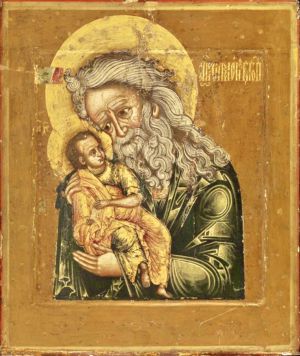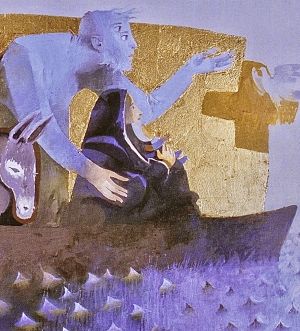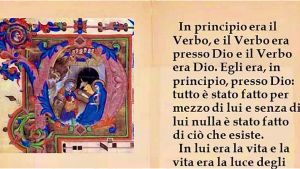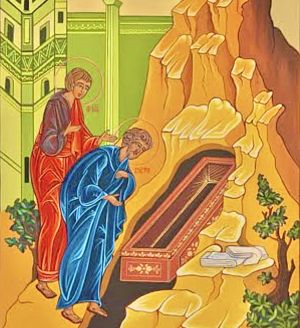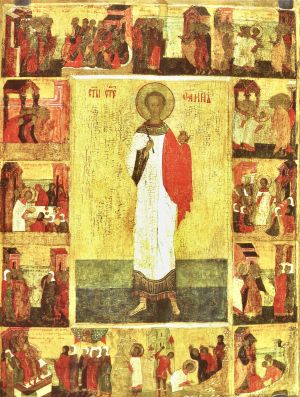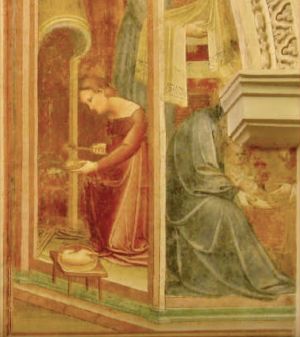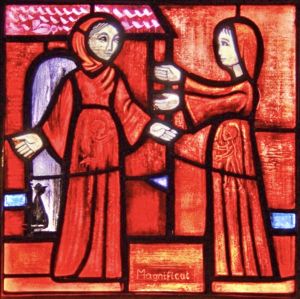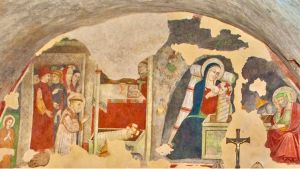
Teresa Girolami
Teresa Girolami è laureata in Materie letterarie e Teologia. Ha pubblicato vari testi, fra cui: "Pellegrinaggio del cuore" (Ed. Piemme); "I Fiammiferi di Maria - La Madre di Dio in prosa e poesia"; "Tenerezza Scalza - Natura di donna"; co-autrice di "Dialogo e Solstizio".
Jesus, brought to the temple by Mary and Joseph, is greeted by the watchman Simeon as «a sign of contradiction [...] that the thoughts of many hearts may be revealed» (Lk 2:34-35).
Francis, in the time in which he lives and following the example of Christ, incarnates, as herald of the Great King, being a prophet and becoming a sign of contradiction, an indispensable condition for entering the Kingdom of God.
A sign of contradiction because he is the bearer of a new world, which leaves behind the remnants of the old one, far removed from the Love that came down from Heaven.
The Sources offer several examples of this being the germ of a new way of thinking.
We read:
"The man of God, wounded by his father's curses, chose a despised poor man as his father and said to him:
"Come with me, and I will give you part of my alms. When you see my father curse me, I will say to you: Bless me, O father! - And thou shalt make the sign of the cross upon me and bless me in his stead'.
As the poor man blessed him thus, the man of God said to his father:
"Do you not think that the Lord can give me a father who, against your curses, will cover me with blessings?".
Many of those who mocked him, seeing him endure all those tribulations with patience, were struck with awe and admiration" (FF 1423).
«Sign of contradiction [...] that the thoughts of many hearts might be revealed» (Lk 2:34-35)
And again, moved by the Spirit, he prophesied concerning St Clare and her sisters:
"There were also other people to help him with the restorations. Francis, radiant with joy, said in a loud voice, in French, to his neighbours and to those who passed by:
"Come, help me in these works! Know that a monastery of ladies will be built here, and by the fame of their holy life, our heavenly Father will be glorified throughout the church'.
He was animated by a prophetic spirit, and foretold what would actually happen.
It was precisely in the sacred place of San Damiano that the glorious and admirable Order of poor women and holy virgins was happily initiated by Francis, about six years after his conversion" (FF 1426).
"Many made fun of him, persuaded that he had given them the run-around; others were pitied to the point of tears, seeing that young man pass so quickly from a life of pleasures and caprices to an existence transfigured by the intoxication of divine love. But he, heedless of ridicule, gave fervent thanks to God" (FF 1421).
Yes, this child who became a bold young man, leaving the merry band, is transformed by Grace into that indisputable sign of contradiction that brings to light the truth that dwells in every heart, in the footsteps of Christ.
And, when the mission was accomplished, before his brothers, having himself placed on the bare ground, he reminded them that he had pledged to do his part and that the Lord would instruct them to do theirs.
29 December - fifth day between the Octave of Christmas (Lk 2:22-35)
The Gospel of Matthew recounts the flight into Egypt of the Family of Nazareth due to Herod's persecution, who, in order to eliminate Jesus, had all the children in Bethlehem and the surrounding area killed.
This unique family was rejected from the moment it was formed, a model of perseverance in the face of trials.
Francis, God's jester, after Grace had made him a new creature, preferred the family given to him by the Father of mercies to his natural family.
In fact, without hesitation, in front of the bishop of Assisi and all those present, he stripped himself naked as a sign of abandonment, adding:
"Until now I have called you my father on earth; from now on I can say with complete confidence: Our Father, who art in heaven, because in Him I have placed all my treasures and all my trust and hope" (FF 1043).
This was an eloquent response to the old world that left him languishing in its pleasures, preferring to enjoy the sweetness he breathed at home in Nazareth.
Francis is in tune with the Holy Family: both in his personal life and in the community that developed around him.
In fact, he nourished himself with poverty and simplicity, growing in age, wisdom and grace before God and his beloved brothers.
He was submissive to every brother and sowed everywhere that extraordinary infused wisdom that came to him from above, pure and yielding.
Mary accompanied him everywhere.
He clung to her in every important event, so much so that he called her the Advocate of the Order, she who had made our brother the Lord of Majesty.
But no less so, Clare was part of the unique, silent Family of God - so fully that she received the gift (now ill and no longer able to go to church) of participating sensitively in the Christmas Liturgy.
The Father of Mercy and the entire Nazareth Family were with her.
The Sources inform us:
"At that hour of Christmas (1252), when the world rejoiced with the angels for the newborn Child, all the women went to Matins at the place of prayer, leaving the Mother alone, burdened by her infirmity.
And, having begun to think of the little Jesus and to grieve greatly that she could not participate in the singing of his praises, she sighed and said to him:
'Lord God, here I am, left here alone for you!'.
And suddenly, the wonderful concert taking place in the church of St Francis began to resound in her ears.
She heard the friars singing psalms in jubilation, followed the harmonies of the singers, and even perceived the sound of the instruments.
The place was not close enough to allow human perception of those sounds: either that solemn celebration was made divinely sonorous enough to reach her, or her hearing was strengthened beyond all human possibility.
Indeed, surpassing this miracle of hearing, she was even worthy of seeing the Lord's crib.
When her daughters came to her in the morning, Blessed Clare said:
'Blessed be the Lord Jesus Christ, who did not leave me alone when you abandoned me!
By the grace of Christ, I heard all the ceremonies that were celebrated last night in the church of St Francis" (FF 3212).
In the communities of Francis and Clare of Assisi, the spirit of the Family of Nazareth, experienced in suffering but also a place of genuine virtue, was alive and well. Clare, like another Mary, meditated in her heart on the mysteries of the Son of God, well understanding the apprehensions and dangers of flight. She herself, leaving the old world that pursued her, had known hardship and tribulation.
All these experiences helped her, on her journey as a Poor Woman, to relive the events of the family of Nazareth in depth.
«Now after Herod died, behold, an angel of the Lord appeared to Joseph in Egypt, saying, 'Rise, take the Child and his Mother, and go to the land of Israel'» (Mt 2:19-20a)
Holy Family of Nazareth (year A) (Mt 2:13-15, 19-23)
One of us. Prologue of Jn, Francis and Clare
In the context of Christmas, to remember St John the Apostle is to put contemplation of the Mystery first. He who, like a sack of myrrh on his breast, reclined his head on that of Christ and, because of the Love that animated him, arrived first at the tomb of his Friend.
«But the other disciple ran faster than Peter and reached the tomb first» (Jn 20:4).
Francis is the one who, out of the Love that inflamed him, was the first to run to the Crib; he was the first to see the signs and welcome them into his heart.
Without giving way to aleatory contemplation, the Poor Man of Assisi first, in Greccio, wanted to tangibly see the hardships, the hardships, the penury of the Lord from the very beginning of his human parable descending from Heaven.
The mysticism that informed him was the fruit of intimate union with Jesus, with the Child of Bethlehem.
The Sources remind us:
"Having by intimate prayer and frequent contemplation attained an extraordinary familiarity with God, he longed to know what of him and in him could be most pleasing to the eternal King" (FF 479).
Says Celano, his well-known biographer:
"He was not so much a praying man as he himself was transformed into living prayer" (FF 682).
Already... the same prayer, transferred into the spirit that had animated the living, palpitating representation of Greccio.
The Beauty that traverses the events narrated by the Sources gives us evidence of this:
"Above all solemnities, he celebrated the Christmas of the Child Jesus with ineffable solicitude and called the day on which God, made a little infant, had sucked at a human breast a feast of feasts [...].
This Name was as sweet to him as a honeycomb of honey in his mouth.
One day the friars were discussing together whether the obligation not to eat meat remained, since Christmas that year fell on a Friday.
Francis replied to Brother Morico:
"You sin, brother, in calling Friday the day on which the Child was born for us.
I want that on a day like this even the walls eat meat, and if this is not possible, at least be smeared with it'" (FF 787).
"He wanted the poor and beggars to be fed on this day by the rich, and oxen and donkeys to receive a larger ration of food and hay than usual.
"If I can speak to the emperor," he said, "I will beg him to issue a general edict, so that all those who are able, should scatter wheat and grain in the streets, so that on a day of such solemnity the birds and especially the larks may have plenty" (FF 788).
Love made Francis capable of going beyond the usual, and able to translate the novelty that crossed the boundaries of the already known.
Because Love arrives first, is in a hurry, brings with it sister solicitude and gives birth to the Unheard of.
«Now the two ran together, and the other disciple ran ahead sooner than Peter and came first to the tomb, and bending down he saw the linen cloths folded apart; yet he did not go in» (Jn 20:4-5)
Octave of Christmas, St. John ap. ev. (Jn 20:2-8)
In this octave of Christmas, the first Christian sanctified by persecution is the young Stephen.
The liturgy proposes a passage from Matthew in this regard.
In it, Jesus invites us to be courageous witnesses, knowing that, brought before the tribunals of men, the Spirit will speak in every believer devoted to the Gospel.
Francis of Assisi experienced in his life, renewed by Christ, the sting of persecution, extended to his brothers in the name of the Word lived to the letter.
In the Sources we read:
"People of high and modest condition mocked and maligned them, even to the point of stripping them of their miserable garments.
The servants of God remained naked because, according to the evangelical ideal, they wore nothing but that one piece of clothing, and moreover they did not ask for the restitution of what was taken from them [...].
Some threw mud on them; others put dice in their hands, inviting them to play; still others, grabbing them from behind by the hood, dragged them on their backs.
These and other such wickednesses were inflicted on them, because they were thought to be such mean beings, that they could be scrambled at will.
Together with hunger and thirst, with cold and nakedness, they endured tribulations and sufferings of all kinds.
But they bore it all with imperturbable patience, according to the admonition of Francis, without allowing themselves to be brought down by sadness or wounded by resentment, without speaking ill of those who afflicted them.
On the contrary, as perfect evangelical men, placed in the occasion of making great spiritual gains, they exulted in the Lord, considering it a happiness to be exposed to such trials and hardships; and, faithful to the Word of the Gospel, they prayed solicitously and fervently for their persecutors" (FF 1444).
Francis, like Stephen, considered persecution to be the sister of poverty and the virtuous crowning of a life dedicated to God without sparing.
Regarding it we find in the Sources, in the Legend of St Clare, how relatives rushed to the monastery to bring home Agnes, Clare's sister, intent on following her on this new journey of faith.
"Hurry up and come home with us!"
But she replies that she does not want to be separated from her sister Clare: then a cruel-hearted knight rushes at her and, sparing no punches and kicks, tries to drag her away by the hair, while the others push and lift her by the arms.
At this the young girl cries out, as she is torn from the hand of the Lord, as if by lions:
"Help me, dearest sister, and do not let me be taken away from Christ the Lord!" "(FF 3205).
But Clare's powerful prayer and her determination got the better of the bullies.
"While they turned away in bitterness at the failure of the undertaking, Agnes got up again joyfully and, now enjoying the cross of Christ, for whom she had fought in this first battle, she gave herself up for ever to divine service" (FF 3206).
Whoever perseveres in his evangelical journey will be saved.
«And you will be hated by all because of my name. But whoever perseveres to the end, he will be saved» (Mt 10:22)
Eighths of Christmas. St Stephen (Mt 10,17-22)
«Do not be afraid: behold, I announce to you a great joy, which will be to all the people, today [...] a Saviour has been born to you, who is Christ the Lord» (Lk 2:10).
Francis' joy was so great at the thought of the Birth of Jesus that, on that day, even the animals had to 'celebrate' such an Event:
"Francis had more devotion for the Lord's Christmas than for any other feast of the year.
Indeed, although the Lord worked our salvation on the other feasts, the Saint said that it was from the day of his birth that he undertook to save us.
And he wanted every Christian at Christmas to rejoice in the Lord and for love of him, who gave us all of himself, to be joyfully generous not only with the needy, but also with animals and birds" (FF 1669).
"Above all solemnities, he celebrated with ineffable solemnity the Christmas of the Child Jesus, and called the day on which God, made a little infant, had sucked at a human breast a feast of feasts.
He kissed with an eager heart the images of those infant limbs, and the compassion of the Child, pouring into his heart, also made him stammer words of sweetness in the manner of children" (FF 787).
Three years before his death, we owe to Francis the first original and authentic live representation of the Lord's Christmas, at Greccio (the night of 25 December 1223), with papal authorisation, and the collaboration of a faithful and pious friend.
He had told the latter to procure a small child "to see with the eyes of the body the discomforts in which he found himself for lack of things necessary to an infant, how he was laid in a crib and how he lay on the hay [...]" (FF 468).
The Sources wonderfully recount:
"And the day of gladness came, the time of rejoicing!
For the occasion many friars from various parts are summoned here; men and women arrive festive from the cottages of the region, each one bringing, according to his possibilities, candles and torches to illuminate that night, in which the Star that illuminated all days and times blazed forth splendidly in the sky.
Francis arrived at the end and saw that everything was arranged according to his desire, and he was radiant with joy.
Now the crib is set up, the hay is placed there, and the ox and donkey are introduced.
In that moving scene, evangelical simplicity shines out, poverty is praised, humility is recommended.
Greccio has become the new Bethlehem.
This night is as clear as day and sweet to men and animals!
People flock and rejoice with a joy they have never tasted before, before the new mystery.
The forest resounds with voices and the imposing cliffs echo with festive choirs.
The friars sing choice praises to the Lord, and the night seems all aflutter with joy.
The Saint stands there before the Crib, full of sighs, his spirit vibrating with compunction and ineffable joy.
Then the priest solemnly celebrates the Eucharist over the crib and he himself savours a consolation he has never tasted before.
Francis put on the diaconal vestments, for he was a deacon, and sings the holy Gospel with a sonorous voice: that strong, sweet, clear voice ravishes all in heavenly longings.
Then he speaks to the people, and in the sweetest of words he evokes the poor newborn King and the small town of Bethlehem.
Often, when he wished to name Christ Jesus, inflamed with heavenly love he called him «the Child of Bethlehem», and that name «Bethlehem» he pronounced by filling his mouth with his voice and even more with tender affection, producing a sound like bleating sheep.
And every time he said 'Child of Bethlehem' or 'Jesus', he passed his tongue over his lips, as if to taste and retain all the sweetness of those words [...].
When that solemn vigil was over, each one returned to his home full of ineffable joy" (FF 468 - 470).
[Christmas of the Lord]
«Blessed is the Lord, the God of Israel,/ for he has visited and redeemed his people» (Lk 1:68).
Francis, a gift from Heaven sent to prepare God's ways, after Providence led him to complete conversion, was transformed by the Spirit into a Prophet for his time and beyond.
In the Major Legend, St. Bonaventure offers us the original figure and experience of the Poor Man of Assisi.
Like John, born to point to the Lamb of God, so was the young merchant's son. Renewed by his new spiritual birth, he sang the Mystery of the Incarnation in the fibres of his own flesh.
In the Sources we read:
"The Grace of God, our Saviour, in these last times has appeared in his servant Francis, to all those who are truly humble and truly friends of holy poverty.
For while they venerate in him the superabundance of God's mercy, they are instructed by his example to radically deny ungodliness and worldly desires, to live in conformity with Christ and to yearn, with insatiable thirst and desire, for blessed hope.
On him, truly poor and contrite of heart, God rested his gaze with great condescension and goodness; not only did he lift him, a beggar, from the dust of worldly life, but he made him a champion, guide and herald of evangelical perfection and chose him as a light, for believers, so that, having become a witness to the light, he might prepare for the Lord the way of light and peace in the hearts of the faithful" (FF 1020).
"Like the morning star, appearing in the midst of the clouds, with the radiant rays of his life and teaching, he drew to the light those who lay in the shadow of death; like the rainbow shining through the bright clouds, bearing in himself the sign of the covenant with the Lord, he proclaimed to men the Gospel of peace and salvation.
Angel of true peace, he too, in imitation of the Precursor, was predestined by God to prepare the way in the desert of the highest poverty and to preach penance by example and word" (FF 1021).
«And you, child, will be called a prophet of the Most High/ because you will go before the Lord to prepare his ways» (Lk 1:76)
Feria proper of 24 December - Christmas Eve (Lk 1:67-79)
«What do you think he will become, this son of mine?»
Today's Gospel presents us with the birth of John, the prophet of Christ, and the amazement of onlookers:
«What shall this child be? And indeed the hand of the Lord was with him» (Lk 1:66).
In the life of Francis, from his birth, a visible sign of God's predilection was manifested on him and his mother Mona Pica.
The Sources make this clear:
"In fact, she was made to share, as a privilege, a certain resemblance to the ancient Saint Elizabeth, both by the name imposed on her son and also by the prophetic spirit.
When neighbours expressed their admiration for Francis' generosity of spirit and moral integrity, she would repeat almost divinely inspired:
«What do you think he will become, this son of mine? Know, that by his merits he will become a son of God».
In fact, this was also the opinion of others, who appreciated Francis already grown up for some of his very good inclinations.
He shunned anything that might sound offensive to anyone and, growing up with a gentle spirit, he did not appear to be a son of those who were called his parents.
Therefore the name of John is appropriate to the mission he then carried out, that of Francis to his fame, which soon spread everywhere after his full conversion to God.
Above the feast of any other saint, he held that of John the Baptist to be most solemn, whose distinguished name had imprinted in his soul a sign of arcane power.
Among those born of women there arose none greater than this, and none more perfect than this among the founders of religious orders. It is a coincidence worthy of note' (FF 583).
Feria proper of 23 December (Lk 1:57-66)
Mary: Life that becomes an unceasing Canticle, and a dance with the Eternal
Paraphrasing a passage from the Spiritual Testament of Clare of Assisi and looking at Mary magnifying the Lord, we could say:
"The Daughter of Zion made herself our way, and this by word and example our blessed father Francis, true lover and imitator of her, showed and taught us" (FF 2824).
For it is now clear that the Poverello saw in Mary the life that becomes an unceasing Canticle to Him who had chosen her in the redemptive mission to be fulfilled with her Son.
Francis recognises in her the Imprint of God, and like Mary he magnifies the Lord and exults in God his Saviour "because he has looked upon the humility of his servant".
Thus Francis, in his Canticle of the Creatures, restores to God the praise due Him for the benefits received from Him, recognising His nullity.
He also invites us to do the same in the "Exhortation to the Praise of God" (Praise of God in the place of the Hermit).
It is interesting to know that these praises were found as the antipendium of the altar in the chapel of St Francis in the place of the Hermit, in the small chapel.
These praises were noted by the companions of the Poverello himself and written on the said panel on the left wall, near the altar, and it is said that Francis wrote them here in his own hand:
"All you who fear the Lord, praise him./ Hail, Mary, full of grace, the Lord is with you..../ Let every living person give praise to the Lord.../ Praise the Lord because he is good/ Praise the Lord O creatures all.../ Blessed be the holy Trinity/ and the indivisible Unity..." (FF 265/a).
And in the famous Canticle, like Mary, she raises her Praise to the Creator and Lord and Saviour:
«Most High, all-powerful, good Lord,/
Yours are the praises, the glory, the honour and all blessing.
To You alone, Most High, they befit...» (FF 263)
«My soul magnifies the Lord/ and my spirit exults in God my Saviour,/ because he has looked upon the humility of his servant» (Lk 1:46-48)
Feria proper, 22 December (Lk 1:46-55)
The Church was built on the foundation of the Apostles as a community of faith, hope and charity. Through the Apostles, we come to Jesus himself. Therefore, a slogan that was popular some years back: "Jesus yes, Church no", is totally inconceivable with the intention of Christ (Pope Benedict)
La Chiesa è stata costituita sul fondamento degli Apostoli come comunità di fede, di speranza e di carità. Attraverso gli Apostoli, risaliamo a Gesù stesso. È pertanto del tutto inconciliabile con l'intenzione di Cristo uno slogan di moda alcuni anni fa: "Gesù sì, Chiesa no" (Papa Benedetto)
Intimidated by the nightmare of demons and concrete dangers, the crowds could not see the possibility of emancipation from an existence of obsessions - slavish, frightened, lost, overwhelmed...
Intimidite dall’incubo di demoni e pericoli concreti, le folle non riuscivano a vedere possibilità di emancipazione da un’esistenza di ossessioni - pedissequa, spaventata, smarrita, sopraffatta…
Justification incorporates us into the long history of salvation that demonstrates God’s justice: faced with our continual falls and inadequacies, he did not give up, but wanted to make us righteous (Pope Francis)
La giustificazione ci inserisce nella lunga storia della salvezza, che mostra la giustizia di Dio: di fronte alle nostre continue cadute e alle nostre insufficienze, Egli non si è rassegnato, ma ha voluto renderci giusti (Papa Francesco)
Against this cultural pressure, which not only threatened the Israelite identity but also the faith in the one God and in his promises, it was necessary to create a wall of distinction, a shield of defence to protect the precious heritage of the faith; this wall consisted precisely in the Judaic observances and prescriptions (Pope Benedict)
Contro questa pressione culturale, che minacciava non solo l’identità israelitica, ma anche la fede nell’unico Dio e nelle sue promesse, era necessario creare un muro di distinzione, uno scudo di difesa a protezione della preziosa eredità della fede; tale muro consisteva proprio nelle osservanze e prescrizioni giudaiche (Papa Benedetto)
It is not an anecdote. It is a decisive historical fact! This scene is decisive for our faith; and it is also decisive for the Church’s mission (Pope Francis)
Non è un aneddoto. E’ un fatto storico decisivo! Questa scena è decisiva per la nostra fede; ed è decisiva anche per la missione della Chiesa (Papa Francesco)
Being considered strong, capable of commanding, excellent, pristine, magnificent, performing, extraordinary, glorious… harms people. It puts a mask on us, makes us one-sided; takes away understanding. It floats the character we are sitting in, above reality
Essere considerati forti, capaci di comandare, eccellenti, incontaminati, magnifici, performanti, straordinari, gloriosi… danneggia le persone. Ci mette una maschera, rende unilaterali; toglie la comprensione. Fa galleggiare il personaggio in cui siamo seduti, al di sopra della realtà
The paralytic is not a paralytic
Il paralitico non è un paralitico
The Kingdom of God is precisely the presence of truth and love and thus is healing in the depths of our being. One therefore understands why his preaching and the cures he works always go together: in fact, they form one message of hope and salvation (Pope Benedict)
Il Regno di Dio è proprio la presenza della verità e dell’amore e così è guarigione nella profondità del nostro essere (Papa Benedetto)
duevie.art
don Giuseppe Nespeca
Tel. 333-1329741
Disclaimer
Questo blog non rappresenta una testata giornalistica in quanto viene aggiornato senza alcuna periodicità. Non può pertanto considerarsi un prodotto editoriale ai sensi della legge N°62 del 07/03/2001.
Le immagini sono tratte da internet, ma se il loro uso violasse diritti d'autore, lo si comunichi all'autore del blog che provvederà alla loro pronta rimozione.
L'autore dichiara di non essere responsabile dei commenti lasciati nei post. Eventuali commenti dei lettori, lesivi dell'immagine o dell'onorabilità di persone terze, il cui contenuto fosse ritenuto non idoneo alla pubblicazione verranno insindacabilmente rimossi.


